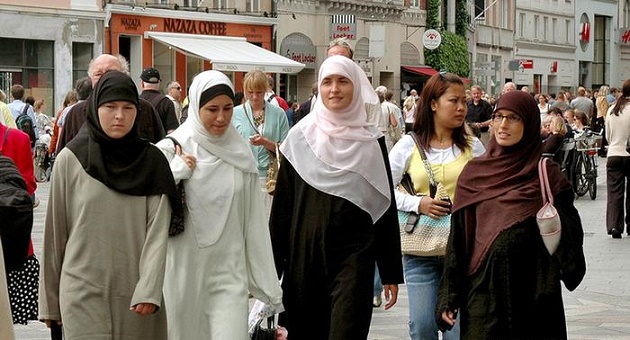More than 1,575 refugees per 100,000 of Sweden’s population claimed asylum last year. But just how large is Europe’s Muslim population, and how fast is it growing?
 A group of Muslim women in Germany. / Picture-Alliance
A group of Muslim women in Germany. / Picture-Alliance
The past year has seen renewed attention drawn to the increasing Muslim population of Europe. The influx of mostly Muslim refugees to the continent, coupled with a succession of terrorist attacks, has led to an increasing uncertainty about the future of the continent. These events have led to calls in many European countries for restrictions on immigration.
According to the International Organisation for Migration, more than a million migrants and refugees crossed into Europe in 2015. Germany has received the highest number of new asylum applications, with more than 315,000 by the end of October, although Sweden had the most in proportion to its population. More than 1575 refugees per 100,000 of Sweden’s population claimed asylum last year. But just how large is Europe’s Muslim population, and how fast is it growing?
The most recent Pew Research Center population estimates were compiled prior to the recent influx of refugees, however they provide a fascinating window into the slowly changing face of Europe. The Pew research has revealed five key facts about the size and make-up of the Muslim population in Europe:
1. Germany and France have the largest Muslim populations among European Union member countries. As of 2010, there were 4.8 million Muslims in Germany (5.8 per cent of the country’s population) and 4.7 million Muslims in France (7.5 per cent). In Europe overall, however, Russia’s population of 14 million Muslims (10 per cent) is the largest on the continent.
2. The Muslim share of Europe’s total population has been increasing steadily. Over the past 25 years, the Muslim share of Europe’s population has grown by about 1 percentage point a decade, from 4 per cent in 1990 to 6 per cent in 2010. There is every reason to expect this pattern to continue, with Muslims likely to make up as much as 10 per cent of Europe’s population by 2030. For more information, go to this site.
3. Muslims are younger than other Europeans. In 2010, the median age of Muslims throughout Europe was 32, eight years younger than the median for all Europeans. The median age of Christians in Europe was 42 while the the median age of religiously unaffiliated including atheists, agnostics and those with no religion in particular, was 37. For more information, go to this site.
4. As of 2010, the European Union was home to about 13 million Muslim immigrants. In Germany, the foreign-born Muslim population is primarily made up of Turkish immigrants, but also includes many born in Kosovo, Iraq, Bosnia-Herzegovina and Morocco. These 2010 figures will likely have been significantly altered by the recent influx of refugees primarily from Syria. The almost three million foreign-born Muslims in France are largely from its former colonies in North Africa (Algeria, Morocco and Tunisia). For more information, go to this site.
5. Views of Muslims vary widely among European countries. A Pew Research Center survey conducted last year found that majorities in France, Britain and Germany had favourable views of Muslims. Opinion was on balance favourable in Spain while negative views prevailed in Italy and Poland. Views about Muslims are tied to ideology. While 36 per cent of Germans on the political right give Muslims an unfavourable rating, just 15 per cent on the left do so. The gap between left and right is also roughly 20 percentage points in France and Italy. And significant differences are found in the UK as well. For more information, go to this site.
*Pew Research Center is a nonpartisan think tank based in Washington, D.C. It provides information on social issues, public opinion, and demographic trends shaping the world. Pew Research Center does not take explicit policy positions.
This article was first published in Solas magazine. Solas is published quarterly in the U.K. Click here to learn more or subscribe.

Las opiniones vertidas por nuestros colaboradores se realizan a nivel personal, pudiendo coincidir o no con la postura de la dirección de Protestante Digital.
Si quieres comentar o